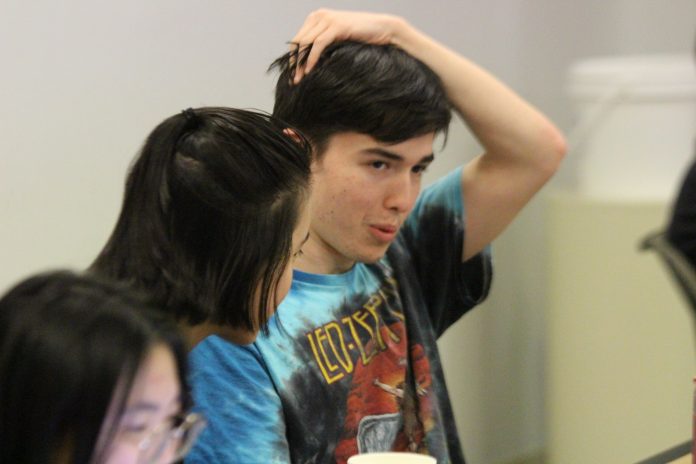Tuesday, Feb. 21, the Student Assembly of the College of William and Mary Senate met at the College of William and Mary School of Education. The change in venue is in compliance with Arts and Sciences graduate Sen. Morgan Brittain’s The Going to the Grads Revival Act, in an effort to foster a closer relationship between SA and graduate schools. The Senate then passed The Give Green a Chance Act, The Collapsible Trash Cans Act and The Extra Allocation for Competitions (EAC) Act.
New Business

With the highest amount of funding requested for the 330th session so far, The NPHC Garden Support Act, introduced by Sen. Sean Nguyen ’25 and Sen. Daniel A. Bess ’24, aims to allocate $50,000 for a donation towards the construction of the National Panhellenic Council Garden during the One Tribe One Day event.
One Tribe One Day, which this year the College designated as Tuesday, April 18, is an annual tradition where students and alumni engage in challenges related to donations.
According to the bill, the NPHC needs $380,000 for construction of the garden to begin, and approximately $17,000 has been given or pledged toward construction since July 2021.
“WHEREAS, the garden will serve as a visible representation of NPHC organizations on campus, relaying history and acknowledging rich traditions … given the sheer amount of money needed to be raised, the fact that the NPHC community is small on campus, and that NPHC is made up of a sizable amount of people who are lower income, the morale for the project has been very low over the years,” part of the bill reads.
The NPHC is the governing council for five of the nine historically African American fraternities and sororities on campus. Bess is a member of the Alpha Phi Alpha, the oldest intercollegiate historically African American fraternity.
According to the project’s page on the College’s website, the garden will be located along the east edge of the sidewalk that cuts across the Crim Dell Meadow, connecting the Sunken Garden to James Blair Dr. and the Sadler Center. A pedestal and plaque will note each organization’s name and crest, the chapter name and the charter date.
“As William and Mary continues to expand its history to be more inclusive, the university has the opportunity to raise the visibility of our historically Black fraternities and sororities and to celebrate their rich legacies and contributions to campus life and society more broadly,” Fanchon Glover, the College’s Chief Diversity Officer, said.
“As William and Mary continues to expand its history to be more inclusive, the university has the opportunity to raise the visibility of our historically Black fraternities and sororities and to celebrate their rich legacies and contributions to campus life and society more broadly,” Fanchon Glover, the College’s Chief Diversity Officer, said.
According to Nguyen, every dollar raised by the Office of University Advancement on One Tribe One Day will match the donation up to $50,000.
“Historically they’ve raised hundreds of thousands of dollars on One Tribe One Day,” Nguyen said. “In the past year they raised it for the Hearth, in conjunction with the NPHC garden, and so that’s why the NPHC garden has been so underfunded.”
Nguyen hopes the College will also provide funding for the project.
“But the goal is by, perhaps even the summer, if they can raise the proper funding, or just build momentum in which perhaps even the school can take some urgency and agency to take those responsibility of the remaining of the funding, then that $50,000 can be raised,” Nguyen said.
Nguyen said the bill is not just to provide financial support for the project but also recognition.
Nguyen also introduced The Review of OBAC’s Annual Revisions Act (ROAR), which was initially on the agenda for the Feb. 14 meeting but was later removed. The bill would enact several major changes to the Organization Budget Allocation Process, including changing the amount of funding derived from the Student Activities Fee Funds that graduate schools will receive.
Earlier, on Tuesday, Feb. 7, the Senate passed a resolution endorsing a change to the student activity fee allocation model, where 75% of the fee paid by graduate students are allocated to the graduate schools according to their enrollment, as opposed to the current amount of 50%.
If the Senate passes the bill, numerous OBAC code revisions would take effect. Namely, SA will no longer enter into a funding contract with Steer Clear – a free, student-operated transportation service for students walking home late at night that dealt with operational issues during the COVID-19 pandemic.
The bill would also increase funding for club interest meetings from $20 to $50, but decrease the maximum request amount $40 to $20 for printing services.
Sen. Matthew Hwang ’25 and Class President Yannie Chang ’25 introduced The Medical Service Informational Campaign Act, which would allocate $523 to fund flyers and cards aiming to raise awareness for medical services in Williamsburg.
Dr. David Dafashy, the medical director and staff physician at the Student Health Center, was consulted in the process and approved of the design of the flyer and the card.
Old Business
The Senate unanimously passed The Give Green a Chance Act, which allocates $550 from SA Reserves to purchase four 96-gallon collection carts with “Compostables Only” stamped on the side from Natural Organic Process Enterprises.
“One of the cons of this bill, I would say is just that, you know, it’s unfortunate that the school isn’t funding this important program, that it has to fall onto Student Assembly, obviously,” Chair of the Senate Student Experience Committee Sen. Max Berckmueller ’23 said, reporting on the committee’s evaluations on the bill.
Berckmueller praised student interns at the Office of Sustainability for their work on sustainability on campus. The office is currently facing leadership challenges following several unfilled vacancies.
The Senate also unanimously passed Lin and Sen. Ashlynn Parker ’26’s The Collapsible Trash Cans Act, which funds 6 trash cans, totaling an expenditure of $60 from SA Reserves.
Finally, the Senate unanimously passed The Extra Allocation for Competitions (EAC) Act, which was introduced during the meeting. However, the Senate passed a motion to move it to old business as Nguyen pointed out that it was an urgent matter. The bill allocates $3,000 from the Student Activity Fee Reserve Fund to the Competition Fund.
The appropriation comes after OBAC granted more funding to the College’s HOSA-Future Health Professionals chapter following their budget appeal that it made regarding funding for the Virginia HOSA State Leadership Conference.
According to the SA code, the Senate may approve the replenishment of monies in increments of no more than $3,000 from the Student Activities Fee Reserve Fund.
If the Senate passes the ROAR Act on Tuesday, Feb. 28, that limit will be increased to $5,000.
Also at this week’s meeting:
- Sen. Shaunna Scott ’23 reiterated that the annual Sankofa Gala was going to be held on Saturday, Feb. 25, in the Sadler Center.
- Nguyen voiced a concern from the Senate Finance committee that collection carts from The Give Green a Chance Act could cause critters to congregate in them. SA Secretary of Sustainability Sydney Thayer ’24, a supporter of the bill, was present for most of the Senate meeting before leaving early.





























